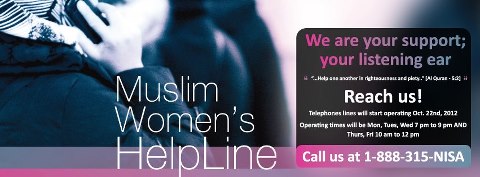Last week, the Toronto Star reported on the first helpline in Canada specifically for Muslim women. The project stems from the Women’s Resource Centre, which is part of the Mercy Mission organisation. At the moment, this program is only available in Ontario, specifically in the Toronto area.
Noor Javed, the author of the article, interviewed Sabah Kazmi, the centre’s program director, who describes that she realized that Muslim women were in need for someone to talk to. Despite the fact that one can find numerous help lines throughout Canada, Kazmi explains that Muslim women were looking for a space that respected and understood their faith and culture.
The helpline was launched last October and it is meant to be a peer-counselling service but not a crisis line. The volunteers are women from diverse cultural and linguistic backgrounds, who have received professional training in counselling. The program has been quite successful and receives numerous calls.
As Javed’s article explains, the idea of the program has received support from Alia Hogben, the Executive Director of the Canadian Council of Muslim Women, who “says such a service, if done professionally, fills a vital need in a community where women often struggle to find support at their local mosques.”
Yet Hogben is also skeptical of the program, as she explains the centre should be very specific on its purpose, mission and values as they will have an impact on the kind of advice given and received. She points out,
“I think it’s important for people to know: What is their philosophy? Is it non-judgmental? People who are calling are already very hard on themselves.”
Nonetheless, Kazmi asserts that the program’s aim is to be there for Muslim women who need to talk, not to preach. She explains that the line is there to support women and advice is not always part of the call; if callers specifically ask for “an Islamic point of view on a topic,” Kazmi explains that such a view will be provided, but always followed up with questions like “What do you think about that? How does it make you feel?”

An ad for the Muslim Women’s Helpline. Via Muslim Fest 2012 Facebook page.
Despite the challenges, I think the idea of a help line that is meant to address Muslim women’s concerns will be an asset to Muslim communities in Canada, and I am hoping for it to soon expand to other areas. A program like this may also support a broader fight to address issues of domestic violence in Muslim communities in Canada, which I discussed last December in another post.
Nonetheless, I also recognize the risks that Hogben has pointed out. Since there is not a lot of information regarding the kind of “Islamic” points of view that the organization endorses (Islamic precepts are often not monolithic and different opinions exist), I would be interested in hearing the kind of advice that volunteers offer to issues of domestic violence, same-sex-relationships, interfaith relationships, pre-marital sex, etc. I would also be curious about the kind of support that is available through the helpline for lesbian Muslims, abused women or Muslim women in interfaith relationships.
While I think that asking “how does that make you feel?” is an important question in the process of reconciling faith and daily life, I wonder to what extent this question brings along understanding and acceptance, instead of an attempt to hold women to normative ideas of “Muslimness” and gender.
Yet, I have hope. Although this is not completely similar, Canada has already seen organizations like Catholic Social Services delivering programs, support and advice not only to Catholics, but to a broad range of people of all faiths and ethnicities. However, organizations like this tend to emphasize their non-judgemental and pro-human rights approaches.
I believe that with a clearer mandate, a non-judgemental approach and a willingness to recognize a variety of opinions in regards to Islamic issues, this centre can fill a gap in our communities by enabling Muslim women to access advice and support networks in times of distress and uncertainty.




